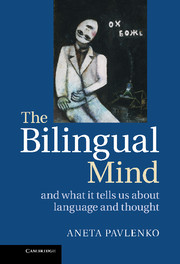Book contents
- Frontmatter
- Contents
- List of Tables
- Acknowledgments
- Preface
- 1 The Sapir-Whorf hypothesis and the bilingual turn in the study of language and cognition
- 2 Material worlds
- 3 Multidimensional worlds
- 4 Dynamic worlds
- 5 Narrative worlds
- 6 Discursive worlds
- 7 Emotional worlds
- 8 The bilingual mind and what it tells us about language and cognition
- References
- Author index
- Subject index
5 - Narrative worlds
Locating ourselves in storylines
Published online by Cambridge University Press: 05 June 2014
- Frontmatter
- Contents
- List of Tables
- Acknowledgments
- Preface
- 1 The Sapir-Whorf hypothesis and the bilingual turn in the study of language and cognition
- 2 Material worlds
- 3 Multidimensional worlds
- 4 Dynamic worlds
- 5 Narrative worlds
- 6 Discursive worlds
- 7 Emotional worlds
- 8 The bilingual mind and what it tells us about language and cognition
- References
- Author index
- Subject index
Summary
The culturally shaped cognitive and linguistic processes that guide the self-telling of life narratives achieve the power to structure perceptual experience, to organize memory, to segment and purpose-build the very “events” of a life. In the end, we become the autobiographical narratives by which we “tell about” our lives.
Bruner, 1987: 15Of all narratives in the world, the one most important to us is the narrative of our own life – its loss shatters our sense of self. A glimpse into such an unpopulated universe comes from Lev Zasetsky, a 23-year-old Russian soldier who received a severe head wound during the 1943 battle of Smolensk. In the notes written later, he poignantly states that this was the day he died:
I’m in a kind of fog all the time, like a heavy half-sleep. My memory’s a blank. I can’t think of a single word. All that flashes through my mind are some images, hazy visions that suddenly appear and just as suddenly disappear, giving way to fresh images. But I simply can’t understand or remember what these mean. Whatever I do remember is scattered, broken down into disconnected bits and pieces … How horrible this illness is! I still can’t get a grip on myself, can’t figure out what I was like before, what’s happened to me…
(Luria, 1972: 11–13)The damage to the left occipito-parietal region left Zasetsky with severe amnesia: while he eventually recovered memories of his childhood, he had trouble remembering the recent past and the functions of everyday objects. Zasetsky also suffered from aphasia, where linguistic forms became disconnected from their referents: looking at objects, plants or animals he could not remember their names, hearing words he could not interpret their meanings, nor could he recall words at will. He also partially lost his vision and spatial orientation skills: he could not see his own right side and everything he perceived appeared as fragments in a constant state of flux. “It was depressing, unbearable to realize how miserable and pathetic my situation was”, states Zasetsky in his diary, “You see, I’d become illiterate, sick, had no memory” (Luria, 1972: 35).
- Type
- Chapter
- Information
- The Bilingual MindAnd What it Tells Us about Language and Thought, pp. 169 - 205Publisher: Cambridge University PressPrint publication year: 2014
- 1
- Cited by



